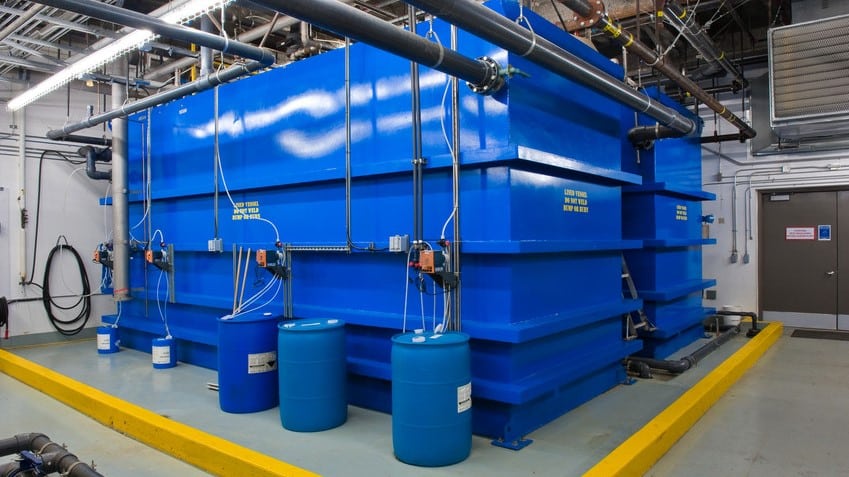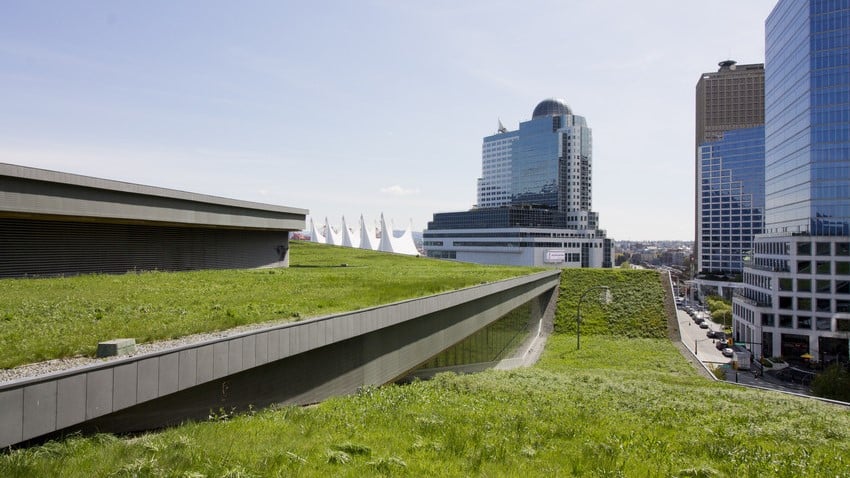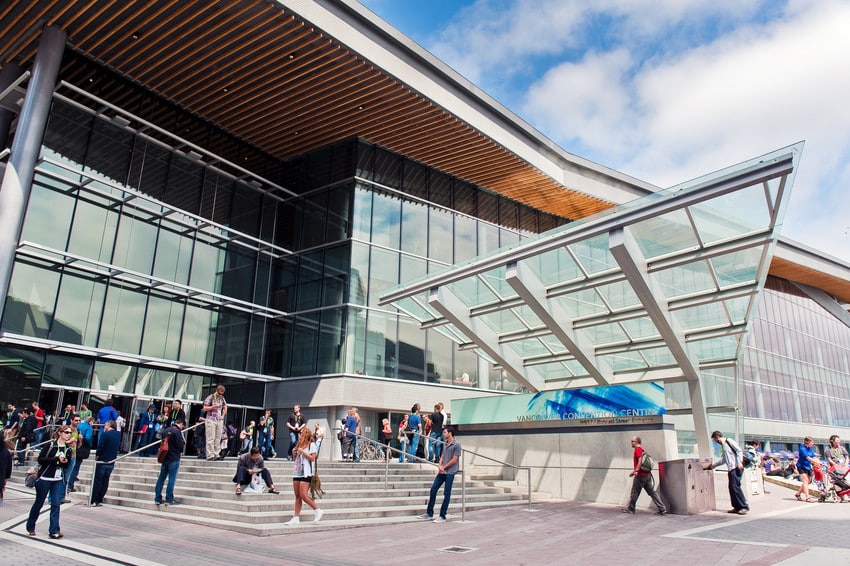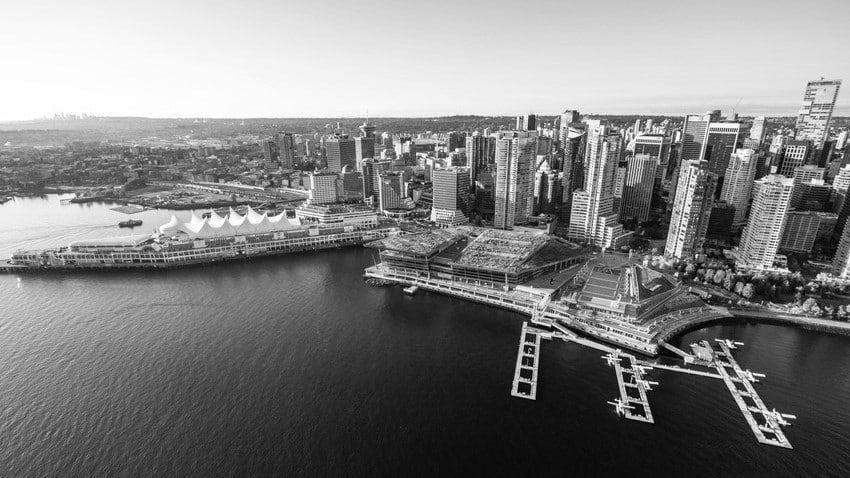Vancouver Convention Centre – West
Vancouver, British Columbia
September 16, 2022
- Rating System/Standard
- LEED v4
- Certification Level
- Platinum
- Building Type
- Public Assembly
Maintains double LEED Platinum certification
Nestled in the heart of Downtown Vancouver, the Vancouver Convention Centre (VCC) has been helping its clients plan and deliver exciting events for more than 35 years. With more than 100,000 square metres of convention space, the venue is comprised of a restored marine habitat embedded into the building’s foundation, and a flourishing six-acre living roof irrigated by an onsite blackwater treatment plant, making the VCC one of Vancouver’s most iconic landmarks.
The Vancouver Convention Centre was the first convention centre in the world to achieve double LEED Platinum – the first for Building and Construction (2009; for the lifetime of the building) and the second for Building Operations and Maintenance (2017; renewal in 2022) of the West building.
Sustainability was a key priority in the construction of the VCC and continues to be integral in how it operates. To that end, the VCC was pleased to submit its LEED Platinum for Building Operations and Maintenance for recertification with CAGBC.
In addition to demonstrating its commitment to sustainable practices, maintaining the double LEED Platinum status was also important to the VCC’s story. Its staff, clients and community take pride in knowing that the building is committed to maintaining energy and water conservation practices. The LEED certification is a reputable framework to align its practices.
The Vancouver Convention Centre’s LEED Existing Building Operations and Management recertification of the West building, focused on conservation, biodiversity and waste management as a strategy for achieving its sustainability goals.
Energy Conservation
The Vancouver Convention Centre maintains a low-sloped six-acre living roof, the largest in Canada and the largest non-industrial living roof in North America. In addition to providing habitat for more than 400,000 species of indigenous plants and grass, the living roof also acts as a natural insulator. With approximately 16 cm of soil, the living roof absorbs and retains heat from the sun in the winter and reflects heat during the summer. Due to its porosity, the living roof releases heat more easily compared to concrete. This means the living roof conserves energy by reducing heat gains in the summer by approximately 96 percent and heat losses for the winter months by 26 percent.
One of the key sustainable aspects of the facility is the state-of-the-art geothermal heating and cooling system. Powered by renewable energy, this system uses seawater from the Burrard Inlet to heat and cool the facility with almost zero carbon emitted to the atmosphere. This state-of-the-art system was recently upgraded to include Sea Water Copper Treatment Tanks reducing cleaning duration, frequency, and improving the efficiency of heat exchangers. The seawater heating and cooling system conserves a significant amount of energy, leading to a 2-4 percent reduction in annual energy cost estimates.
Greenhouse gas emissions were reduced by around 150 tons of carbon dioxide equivalent per year by installing a heat recovery system that recovers heat from the building to preheat domestic hot water for the facility.
Water Conservation
Being located along the oceanfront, the Vancouver Convention Centre takes its role in conserving and caring for local waters seriously. To support water conservation, the team implemented ambitious and innovative strategies to reduce the total potable water consumption. Most notably, the Black Water Treatment Plant receives and processes wastewater from throughout the facility to render it reusable for non-potable applications, such as in washrooms and to irrigate the living roof. This reduces reliance on domestic fresh water by approximately 70 percent. In 2021, the Black Water Treatment Plant produced over 37 million liters of water. The VCC recently upgraded feed pumps and feed pump pipes, which are connected to the clean, treated blackwater holding tank. This allows the VCC to use less water, and the team continues to optimize the performance of the plant.

In line with its commitment to caring for local waters, the Vancouver Convention Centre oversees an artificial marine habitat, which is built into the foundation of the building. The five-tiered concrete skirt includes 60 metres of shoreline and 140 square metres of artificial reef.
The VCC welcomes and supports research into the artificial marine habitat and often collaborates with marine biologists to assess its health. The artificial marine habitat has vastly improved water quality and biodiversity in the region, with the arrival of various types of seaweed, macro-algae, and fish.
The seaweed and macro-algae make an attractive feeding site for sessile, mobile, and benthic invertebrates which various types of fish subsequently feed on. Simultaneously, the artificial reef guides the path of salmon migrations around the perimeter of foundation piers. In one survey report, 43 local species of marine organisms and fish were found in the area despite the heavily industrialized waterfront area.
The VCC’s living roof is also important for the region’s insects and birds. Supporting the work of Karen Needham, a lecturer and curator for the Spencer Entomological Collection at the University of British Columbia’s Faculty of Science, an insect survey revealed the VCC’s living roof was critical habitat for 17 species of syrphids or flower flies. This group of insects is the second most important group of pollinators after wild bees and their presence indicates local biodiversity is improving. Learn more about her work on the living roof here.

Waste Management
The Vancouver Convention Centre developed a robust waste management system that supports the essential environmental principles of reduce, reuse, and recycle. Throughout the fiscal year of 2021/22, the Convention Centre hosted more than 1.8 million visitors. Working closely with Happy Stan’s Recycling (HSR) to perform monthly waste audits that outline waste streams and diversion rates, the VCC carefully tracks its performance and frequently seeks out opportunities to improve its waste management program. Additionally, HSR provides waste audits per event as requested offering greater insight into event-specific waste.
On-site waste sorters regularly conduct waste audits to identify opportunities and track progress – this means checking all trash bags to identify which materials are not recycled properly. Over 85 percent of all the waste that leaves the VCC West is recycled or re-used, and not sent to a landfill. Additionally, all revenue from bottles and cans collected over events support local organizations, such as United We Can.
To reduce the use of single-use plastic water bottles, 21 touchless metered water bottle filling stations were added at the VCC.
In 2021, the VCC installed two onsite bio-composters. The bio-composters use heat, agitation, and microbes to break down the mass of organic waste, reducing its mass by approximately 70-80 percent. With less mass, less transport is required, thereby also minimizing associated environmental impacts.

Looking forward
The Vancouver Convention Centre recognizes that sustainability is an ongoing commitment. As new technologies and research become available, the team looks forward to continually assessing their application in the building. To learn more about their practices, please visit: www.vancouverconventioncentre.com.
For more information about the Vancouver Convention Centre’s LEED Building Design and Construction check out this previous case study.
Project team
- Project Owner
- BC Pavilion Corporation (BC PavCo)
- LEED / Sustainability Consultant
- Building Energy Solutions Ltd. (BES Canada)
- Mechanical Engineer
- Stantec Consulting
- Electrical Engineer
- Schenke/Bawol Engineering Ltd.
- Structural Engineer
- Glotman Simpson Consulting Engineers and Earth Tech (Canada) Inc.
- Landscape Architect
- PWL Partnership Landscape Architects Inc.
- Commissioning Authority
- KD Engineering Co.
